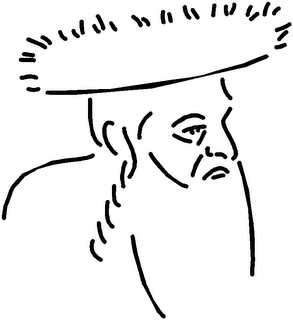 I've long thought that if we would republish the stories in Nach (the Hebrew biblical books outside of the Pentateuch) under a different cover, dressed up in modern language and perhaps illustrated by a skilled illustrator, it would put any modern history text or popular work to shame. The narrative is so varied and stories so numerous that a skilled storyteller should be able to regale anyone, whether young or old, ignorant or educated, for hours and hours on end.
I've long thought that if we would republish the stories in Nach (the Hebrew biblical books outside of the Pentateuch) under a different cover, dressed up in modern language and perhaps illustrated by a skilled illustrator, it would put any modern history text or popular work to shame. The narrative is so varied and stories so numerous that a skilled storyteller should be able to regale anyone, whether young or old, ignorant or educated, for hours and hours on end.There are tales of war and intrigue, ghosts and angels, prostitutes and generals, kings and rebels, outsized heroes and frightening villains, loss and grief, guile and innocence, religious devotion and pagan tomfoolery, horrible rape and tender love, wanton murder and miraculous resurrection, terrible revenge and great reward, irony and revelry, and what not? They run the gamut of the human experience in both fact and fiction, sprinkled with poetry throughout and all set in the great arc of Jewish history. No wonder we, entertainment-averse Chassidim, refuse to teach Nach in our schools!
Apparently, the entertainment and business potential of all that wasn't lost on one Suleyman, an Arab dragoman living in 19th century Syria. A clever and witty fellow, that Suleyman, and one who obviously knew his trade well and understood how to tailor his services to his clientele, all while amusing himself with his ability to befuddle his charges with what should've been very familiar stories. And so, here is his unique take on Sampson's revenge (Judges 15) and Elijah's slaughter (1 Kings 18:40), courtesy of the memoirs of Marmaduke William Pickthall:
One English parson he [Suleyman] bedevilled utterly by telling him the truth--or the accepted legend--in such a form that it seemed false or mad to him.
As they were riding out from Jaffa towards Jerusalem, he pointed to the mud-built village of Latrun and said:
'That, sir, is the place where Simpson catch the foxes.'
'Ah?' said the clergyman. 'And who was Simpson?'
'He was a very clever gentleman, and liked a bit of sport.'
'Was he an Englishman?'
'No, sir; he was a Jew. He catch a lot of foxes with some traps; he kill them and he take their skins to Jaffa to the tailor, and he tell the tailor: "Make me one big skin out of these little ones." The tailor make one thundering big fox's skin, big enough for Simpson to get inside of it. Then Simpson, he put on that skin one night, and go and sit out in the field and make the same noise what the little foxes make. The little foxes come out of their holes to look; they see one big fox sitting there, and they not know it's really Simpson. They come quite near and Simpson catch hold of their tails and tie their tails together. Then they make the noise, and still more foxes come, and Simpson catch hold of their tails and tie their tails together, till he got hundreds and hundreds.'
'Whatever did he do with them?' inquired the parson.
'He set fire to them.'
'What on earth did he do that for?'
'That, sir, was to annoy his wife's relations.'
'And would you believe it,' added Suleyman when he told me the story, 'that foolish preacher did not know that it is in the Bible. He took it all down in his notebook as the exploit of a Jewish traveller. He was the Heavy One.'
...
One afternoon, when I was riding round the bay from Akka towards the foot of Carmel, supposing Suleyman to be a hundred miles away, I came upon a group of tourists by the river Kishon, on the outskirts of the palm grove. They had alighted and were grouped around a dragoman in gorgeous raiment, like gulls around a parrot. The native of the land was holding forth to them. His voice was richly clerical in intonation, which made me notice that his audience consisted solely of members of the clergy and their patient women.
'This, ladies and gentlemen,' the rascal was declaiming like a man inspired, 'is that ancient riffer, the riffer Kishon. It was here that the great Brophet Elijah bring the Brophets of Baal after he catch them with that dirty trick which I exblain to you about the sacrifice ub there upon that mountain what you see behind you. Elijah he come strollin' down, quite habby, to this ancient riffer, singin' one little song; and the beoble they lug down those wicked brophets. Then Elijah take one big, long knife his uncle gif him and sharben it ubon a stone like what I'm doin'. Then he gif a chuckle and he look among those brophets; and he see one man he like the look of, nice and fat; and he say: "Bring me that man!" They bring that man; Elijah slit his throat and throw him in the riffer. Then he say: "Bring his brother!" and they bring his brother, and he slit his throat and throw him in the riffer ... till they was ALL gone. Then Elijah clean his knife down in the earth, and when he'd finished laughin' he put ub a brayer.
'That was a glorious massycration, gentlemen!'
The preacher was Suleyman, at struggle with the Heavy Ones.
(Hattip: BAR)




|